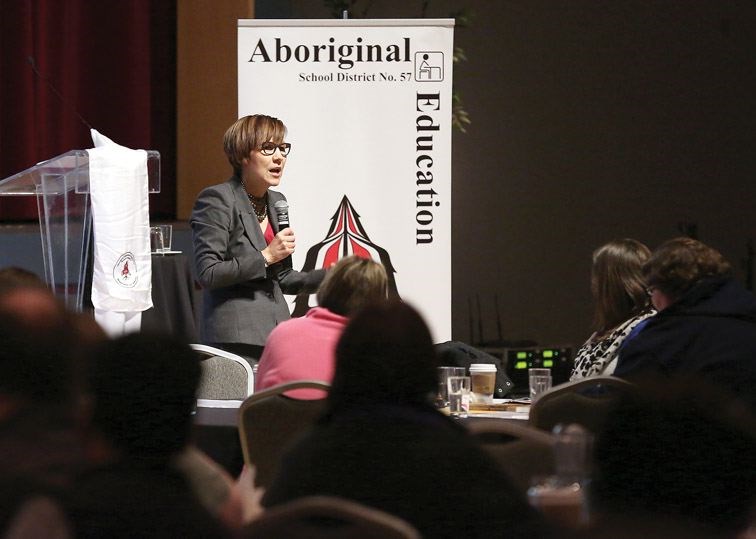School District 57 set aside a day for its educators to absorb ideas about indigenous learning in the third - and largest yet - Northern Aboriginal Education Symposium.
When the final count came in 710 people had registered for the Friday session, including educators, trustees, elders and community members, mostly from Prince George.
Shelly Niemi, who has led the transformation of aboriginal education services in the district, said there's much to celebrate: last year the aboriginal graduate rate rose to its "all-time highest" at 61 per cent. That's a 13 per cent jump over the 2014 rate of 48 per cent completion. Even so, aboriginal learners are far behind their non-aboriginal counterparts. More than 80 per cent of non-aboriginal students will graduate.
"There is still a gap," said Niemi, School District 57's aboriginal education manager.
The district has 3,380 self-identified aboriginal students, which account for 28 per cent of the student population.
"We are the largest district in the province of British Columbia to have aboriginal student learners."
When Niemi started her foray into aboriginal education, she recalled going to a First Nations Education Steering Committee conference and listening to Cindy Blackstock, who was the keynote speaker at Friday's conference.
"We listened to you speak and you changed us and because of you we're going to continue to champion and push forward ahead because our kids deserve it," Niemi told Blackstock, who as executive director of the First Nations Child and Family Caring Society led its fight against the Canadian government for discriminating against indigenous children.
In a Jan. 26 landmark ruling the Canadian Human Rights Tribunal said the Canadian government failed First Nations children because it doesn't provide them with the same level of services as others.
Blackstock told the audience that when the society launched the battle in 2007, within 30 days its federal funding was cut.
She showed slide after slide of internal government documents that acknowledged the discriminatory practices, but failed to act on the information. She said she tried to push for change from within, using that evidence, but it didn't work.
"That's the problem with incremental inequality," said Blackstock, pointing to one such document.
"It never comes."
Behind Blackstock, for much of her speech, a quote remained on the large screen: "school should be a time for dreams - every kid deserves this."
They were the words of Attawapiskat First Nation's Shannen Koostachin, who fought for equality of education for kids on reserves until her death at age 15 in 2010.
Blackstock spoke of how Koostachin managed to rally children of all backgrounds.
"Children know about love and fairness," she said. "You know the great thing about kids? They'll get down to working when something isn't right. They don't strike a committee."
To start her speech, Blackstock said she believed Canada was in a historical moment and one that can lead to reconciliation.
"We're going to have to confront some very difficult truths about our country - and that is that it was born from racism, that we have normalized it so deeply in our society," said Blackstock.
"We have before us right at this moment an opportunity to end Canada's long standing racial discrimination as fiscal policy against First Nations kids, but it's going to take all of you - and more than all of you, it's going to take all of the kids in your classroom."
Marie Battiste, an author and University of Saskatchewan professor, addressed decolonizing education.
"When you do not have indigenous in the curriculum, silence is the shield of domination," said Battiste who said it's essential educators take to heart the adage "nothing about us without us."
She said First Nations share common experiences: colonization, marginalization, powerlessness, exploitation, racism, violence and cultural imperialism.
"We are also place-based cultures," Battiste said.
"Our land and our languages are connected"
Battiste described a type of cognitive imperialism and challenged educators to acknowledge a solely eurocentric approach to pedagogy can be damaging in the narratives it enforces, including ideas of success.
"This notion that success is what we are aiming to is everything that's assimilative. It erodes the collective identities and corrodes collective culture and languages and it also privileges certain kinds of things," she said.
"It creates multiple oppressions that are race, class, gender normalized in the ways in which we teach, in the curriculum that we use, in the multimedia that we have in terms of the various kinds of hidden curriculum and it results in those damaging identities and negative self concept and lack of self-confidence."
In September, B.C. announced curriculum at all grade levels that would include aboriginal perspectives as well as the history and legacy of the residential school system.
The symposium showcased the district's aboriginal education department through a screening of the documentary called Crow Brings A Message and also featured a panel on "authentic allies" from the school and community.
"We can't do this work alone so that's why we need people to step into the arena with us," said Niemi.
Sherry Thibault, principal of Prince George secondary school, said adopting aboriginal perspectives in teaching takes openness and a desire to remove barriers.
"This work has become sort of the moral imperative, the inclusivity of our kids and the recognition of indigenous knowledge and ways of learning, said "You have to be passionate you have to be innovative, you have to believe that education is critical and it facilitates the change."
The moderator asked the panelists why racism is such a difficult topic to discuss and absorb.
"I think part of why it's so challenging is it causes us to examine our own beliefs and values," Thibault replied.
But having those frank discussions doesn't have to be a bad thing, Battiste argued.
"Acknowledging that we are implicated does not have to be a negative, stagnant place: it can be a springboard for action and consciousness."



